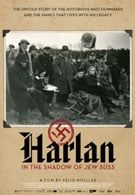Many are well aware of Veit Harlan and the incredible effect films like Jew Süss had on the Third Reich. The infamous German propagandist's films were mandatory viewing for S.S. troops during World War II, and even today much of his work is banned throughout the world. Harlan is long gone but he’s left behind far more than his notorious reputation; a vast bloodline remains. It’s one thing to point a finger at an evil historical figure, but the situation becomes relatable when examined by his relatives in Harlan: In The Shadow of Jew Suss, an interesting but only partially satisfying documentary about the filmmaker’s legacy.
The biggest film of Harlan's career, Jew Süss was a monumental box office hit within the Third Reich and Harlan was presented the 1943 Universum Film Archiv award. But his fortunes changed drastically after the war ended and Harlan was charged with crimes against humanity for having supported the Nazi regime through his work. He was acquitted but was forever plagued by the effects of Jew Süss. Harlan passed away in 1964, but he left his surviving family members with the burden of his actions. Some have changed their names, a few keep the connection to Harlan to themselves and others attempt to justify his actions.
Whether you’re familiar with Harlan or not, In The Shadow of Jew Süss is a compelling documentary. Director Felix Moeller dedicates a portion of the film to trying to understand what Harlan was thinking when he conceded to Goebbels’ request. He investigates that question and many others through archival footage and interviews with Harlan’s relatives.
A significant amount of the film is talking heads. It isn’t visually stimulating, but the passion in the interviews is enough to hold your attention. Interviewees include four of Harlan’s children, his niece, nephew and six grandchildren. Thomas Harlan has the most forceful story having been a staunch supporter of his father and Goebbels prior to becoming radically opposed to the Nazi regime. For Harlan’s other children, this documentary marks the first time they speak out on the issue. Of the grandchildren, the most interesting anecdotes come from Jacoby. While one grandfather was busy creating a Nazi film, her other grandfather perished in the Holocaust.
In The Shadows of Jew Süss is an adequate timeline of Harlan’s life but doesn't properly express the movie's effect. By never explaining the terribly potent impact this film had on the Nazi regime and throughout Europe, Moeller makes the interviews nearly ineffective. We never learn why Harlan’s relatives are so haunted by Jew Süss and his legacy. The emotion in the interviews is there, but without the proper foundation, they lose the power to relay that sentiment.
The manner in which Moeller connects the dots is nearly seamless. Save for a few instances where an on-camera interview carries on for far too long, the film maintains a steady pace, and the score retains a sense of dismay without creating an unnecessarily depressing tone that would tarnish the more hopeful moments. Even with its slight sense of buoyancy, In The Shadows of Jew Süss is clearly the tale of a family torn apart by its patriarch’s poor decisions. It’s poor decision making on Moeller’s part that hinders the surviving family members from wholly expressing their distress.
Staff Writer for CinemaBlend.
Most Popular





